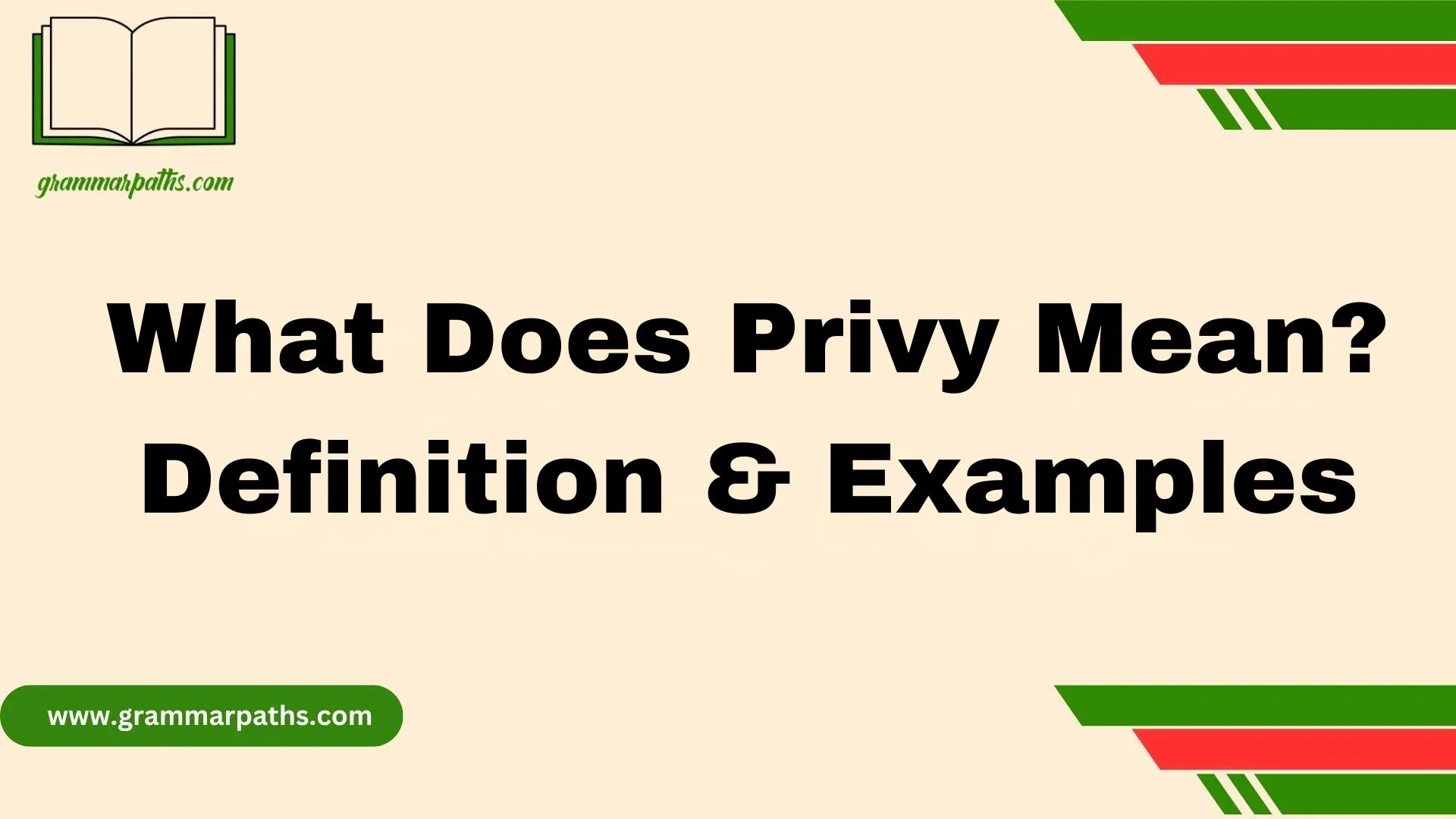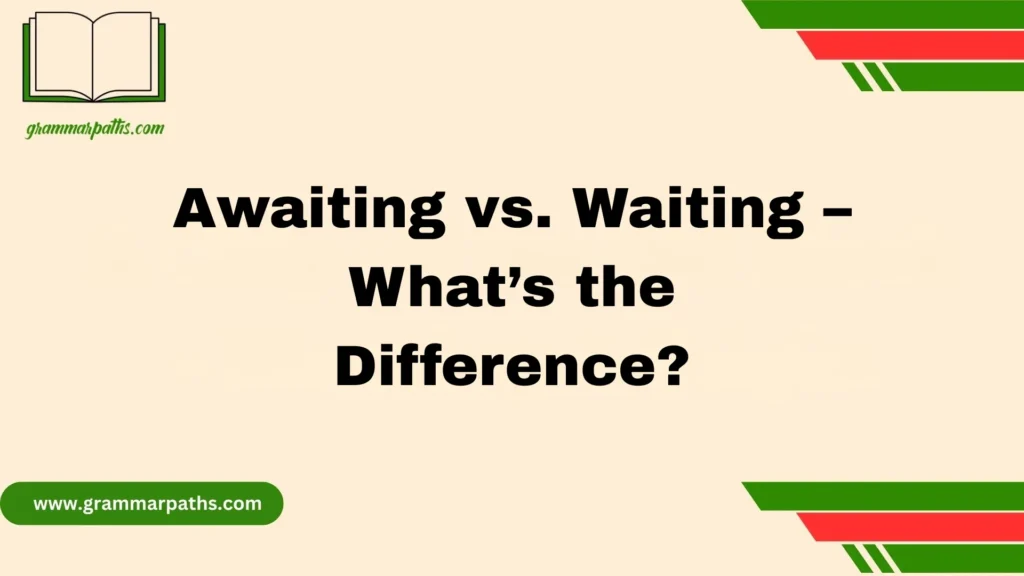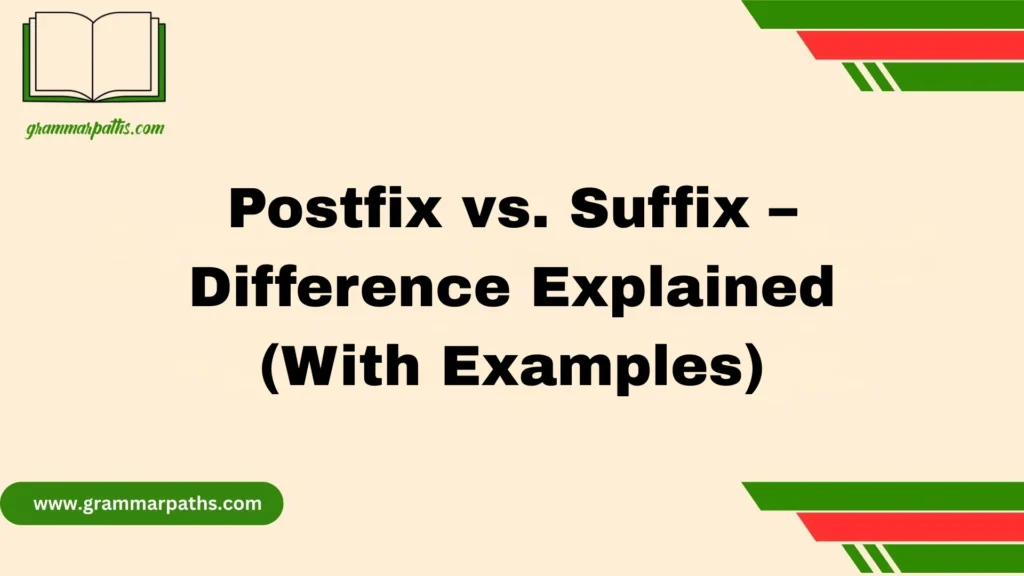I’ve always been curious about how a single word like privy can hold so much history, and in exploring What Does Privy Mean? Definition & Examples, I’ve found it opens a doorway to language’s deeper connections. I remember reading an old mystery novel that piqued my interest with an intriguing plot, where I learned to grasp its meaning. The sound of it felt ancient yet used today, bringing a unique charm to English. In those paragraphs, I discovered something fascinating I had to share, because it happened in a way I couldn’t forget—it still makes me want to know more. The next time I came across it, I paused; it was through these moments that I realized you might feel the same about such a timeless term, one that lives with the careful usage of a writer and reader in equal measure.
In real life, privy refers to being part of a select group of people who have access to certain information not available to others, often implies secret knowledge or confidential matters. For example, a company’s business plans might be kept from the public. Additionally, it’s an old-fashioned name for a toilet, usually located outside the main building—something I know from travels. Even though in legal, political, or social settings it may be about who is informed, in centuries past its history, nuanced tone, and precise usage carried weight in literature and courtrooms. The term is rare yet trusted deeply, used to mean exactly what’s intended. I’ve taught students to encourage a deep dive and explore how it truly came from strong roots in modern language. Like a tiny, powerful key, choosing words wisely helps us connect through time, adapt to a changing world, and carry meaning in special, specific ways that hold and keep the past alive.
Understanding the Meaning of Privy
Let’s start with the basics. In today’s American English, privy most often means:
- Adjective – Being in on something secret or private.
Example: “I was privy to the details before the announcement.” - Noun – An outdoor toilet, especially in older or rural settings.
Example: “The cabin had no indoor plumbing, just a small wooden privy out back.”
Here’s a quick visual comparison:
| Part of Speech | Meaning | Example in a Sentence | Common Today? |
| Adjective | Knowing something secret or private | “Only the board was privy to the merger details.” | ✅ Yes |
| Noun | An outhouse or outdoor toilet | “The old farm still had its original privy.” | ❌ Rare |
Where Did Privy Come From? A Little Word History
Words travel through time like luggage—they pick up dents, stickers, and stories along the way.
- Old French Roots: Privé meaning private or personal
- Latin Origin: Privatus meaning set apart, not public
- Middle English Shift: Adopted into English with two senses—one about secrecy, another about a place for private business (yes, the bathroom kind).
Fun Fact: In the Middle Ages, the idea of privacy was deeply tied to royalty and nobility. Kings and queens had privy councils—small, trusted groups who advised them on sensitive matters. That’s where the adjective meaning took off.
The Adjective Form: Secrets, Trust, and Confidentiality
When someone says you’re privy to something, it means you’re part of a select circle with special knowledge. This isn’t small talk material—it’s the kind of info you wouldn’t post on social media.
Examples of the Adjective in Action
- “Only the HR director was privy to the salary negotiations.”
- “She’s privy to all the behind-the-scenes drama at the network.”
- “As a lawyer, I’m privy to privileged client information.”
Where You’ll Hear It Most
- Legal documents – NDAs, contracts, court statements
- Corporate settings – executive meetings, strategy sessions
- Political discussions – insider briefings, classified reports
The Legal & Corporate Weight of Privy
In law, being privy to information comes with responsibility. Mishandling it can lead to lawsuits, fines, or worse.
Case Study: The NDA Breach
A tech startup founder shared early product designs with a friend. The friend leaked them to a competitor. Because the friend was privy to confidential material under an NDA, the court ruled in favor of the startup and awarded damages.
Key Takeaways for Professionals:
- If you’re privy to sensitive info, protect it.
- In business, privy often signals a legal obligation to keep quiet.
The Political & Diplomatic Side of Privy
While Americans don’t have a “Privy Council” like the UK does, the word still appears in US political journalism and history books—especially when referring to British colonial governance or early state politics.
For example, in 18th-century colonial America, governors sometimes held privy councils to discuss matters out of public view.
Literary Life of the Adjective
Writers love privy because it carries intrigue.
- Shakespeare used it in Othello: “I am privy to the plot.”
- Jane Austen in Emma: “She was privy to many of his designs.”
In modern thrillers, you’ll see it pop up when characters discover a key secret before anyone else.
The Noun Form: Old-Fashioned Toilets & Rural Charm
Switch gears: as a noun, privy means a toilet that’s separate from the main building—usually an outhouse.
Back when indoor plumbing wasn’t standard, every home needed one. It was private (in theory), hence the name.
A Quick Look at the Privy’s Place in American Life
- Common in 19th and early 20th centuries
- Still found in campgrounds, rural properties, and historical sites
- Often a simple wooden structure with a bench seat
Fun Fact: In the 1930s, the US Works Progress Administration even built standardized concrete privies as part of public health programs.
Where You Might Still Encounter the Noun Today
- Historical reenactments (Civil War camps, pioneer villages)
- Rustic cabins without plumbing
- Period literature and films
Example Sentences:
- “Grandpa’s farm still had the original privy behind the barn.”
- “The historic schoolhouse tour included a peek at the outdoor privy.”
Modern Usage in the US
Today, if you hear privy in conversation, it’s almost certainly the adjective form. The noun is rare—unless you’re talking history, camping, or joking around.
Modern Usage Breakdown:
| Context | Adjective Use | Noun Use |
| Business | “Privy to company strategy” | Rare |
| Law | “Privy to legal agreements” | Never |
| Everyday | “Not privy to that conversation” | Almost never |
| History | Somewhat rare | Common in historical writing |
Synonyms & Antonyms for Privy
For the Adjective
- Synonyms: aware, informed, in on, familiar with, entrusted
- Antonyms: unaware, oblivious, excluded
For the Noun
- Synonyms: outhouse, latrine, backhouse, restroom (archaic sense)
- Antonyms: indoor plumbing, modern bathroom
Common Mistakes People Make
- Using it instead of “private” – “I have a privy garden” sounds old-fashioned; “private garden” is more modern.
- Forgetting the legal weight – If you’re privy to classified info, that’s serious business.
- Thinking it’s only British – Americans use it too, just less frequently.
Why Being Privy to Something Matters
In Relationships
Trust deepens when you share information privately. If you tell a friend about a job offer before announcing it, they’re privy to your news.
In Professional Life
Keeping confidences protects reputations and businesses. Breaking that trust can end careers.
Mini Case: Corporate Merger Leak
An assistant leaked details of a pending merger to a competitor. The company proved she was privy to inside information and fired her immediately. She also faced legal action for damages.
Conclusion
The word privy is more than just an old-fashioned term—it’s a linguistic bridge connecting centuries of thought, culture, and conversation. Whether it refers to a select group with access to confidential information or to a rural toilet, its meaning carries a nuanced charm that’s both ancient and relevant today. In exploring What Does Privy Mean? Definition & Examples, we find that this term is a testament to how language can keep the past alive while shaping the modern world.
FAQs
Q1: What does “privy” mean in everyday conversation?
A1: It usually means being informed about secret or confidential matters, often as part of a select group of people.
Q2: Is “privy” still used today?
A2: Yes, it’s used today, both in formal settings like legal or political discussions, and in its old-fashioned sense as a rural toilet.
Q3: Where did the word “privy” come from?
A3: It has roots in centuries-old English, drawing from history and nuanced usage in literature and courtrooms.
Q4: Can “privy” be used in writing creatively?
A4: Absolutely. Writers often use it to carry a meaning of secrecy, trust, and exclusivity, giving their work a unique and intriguing tone.
Q5: What’s an example of “privy” in a business context?
A5: “Only senior management was privy to the company’s new plans before the public announcement.”

Mia Rose is the passionate writer and founder of GrammarPaths.com, a resource dedicated to helping learners master English grammar, idioms, and writing skills with ease. With a deep love for language and years of experience in teaching and content creation, Mia simplifies complex grammar rules into clear, practical guides that readers can instantly apply.










